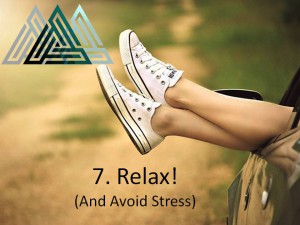The 9 most FAQ about Parkinson’s & stress
1 WHAT IS TENSION?
Tension is the feeling of excitement you get with anything scary, risky, new or important. And you can’t do without it: life would be very boring. Everyone needs variety, surprises and challenges. You can’t avoid tension and you wouldn’t want to.
2 HOW DOES MY MIND/BODY REACT TO TENSION?
Tension is also a sign of a conscious or unconscious feeling of being threatened (‘new=potential danger’). Historically the most common threat is of a predator hunting you down. Your body automatically readies itself for fight or flight, by increased muscle tension (Is that where the word comes from? Yes it is!), faster breathing, higher alertness, and a smaller focus of attention.
In our modern society lions and tigers are not seen very often, but we haven’t evolved so far yet as to change our reaction to something more appropriate.
3 WHAT IS STRESS?
Each time after a period of tension you need a period of relaxation to recuperate from the strain. Stress is a result of experiencing tension for too long and/or too often, without enough rest. Eventually you will develop mental and physical symptoms. Stress is quite literally a case of over-exertion.
4 WHAT KINDS OF DAMAGE DOES STRESS DO?
Well-known stress symptoms are lack of sleep, tiredness, stiffness of neck and shoulders, headaches and back pain that can all develop into chronic afflictions. Again an indication of the unity of body and mind: tension is mainly mental, but the symptoms are mainly physical.
And it has been a known fact for a very long time that stress is a threat to the whole body, including the immune system. Stress lowers your resistance to diseases and your ability to heal! It will literally make you sick.
For progressive, chronic conditions like PD this may even mean that the progression goes faster than it has to.
5 WHAT CAN I DO AGAINST STRESS?
First of all it is crucial to recognize (and admit to) the signs of tension and imposing stress. I’ve seen loads of people who just don’t (or won’t) acknowledge stress (“Hey, I’m a guy, fireproof and unbreakable!” or “Hey, I’m a mother of six, I can’t afford to relax!”).
Do you know people like that? Could you BE people like that?!
When you experience tension and it’s temporary, no harm done. But once you experience stress, all you can do is relax more (and when you think you’ve relaxed enough, please double the time you have been relaxing).
It is ideal if you can eliminate the sources of stress, but that isn’t always possible. What you CAN often do, is change the way you handle and feel about those sources. More on that in articles to come.
6 HOW DO I RECOGNIZE TENSION?
Tension may lead to having trouble catching sleep, muscle aches, worrying and feeling restless. And, as already mentioned, if that is not endured too long and you get enough rest afterwards, there is no problem.
But when you find those symptoms come along often or stay too long, watch out for stress symptoms (see question 4) and act accordingly.
7 WHAT IS THE SIMPLEST WAY TO RELAX?
The simplest way I know is the ‘Sarnoff Squeeze’ (discovered by an actress with stage fright):
1. Sit up straight in a chair. Make sure your back is straight and vertical.
2. Slightly bend over forward, just far enough to not touch the back of the chair.
3. Bring your hands together before you chest, elbows in line with your hands, fingers pointing up. Press your hands together so that you feel a force in your hands and arms.
4. Say “sssssss…” (like a ‘hissss’ breathing out, keeping your lips slightly apart).
5. Relax your muscles after breathing out completely.
6. Breathe in and out in a relaxed way (belly breathing).
Other techniques let you focus on your breathing completely or concentrate inward (try Googling ‘body scan’ or ‘mindfulness’).
8 WHAT CAN I DO TO PREVENT STRESS?
The most important elements have already been mentioned:
• Plan periods of relaxation, especially when you you know stressful events are coming up.
• Plan enough rest after those events too.
• Make sure you get enough sleep.
• Learn how to recognise tension and stress (start feeling! And acknowledging.).
• Learn how to relax and exercise relaxing on a regular basis.
9 WHAT ELSE SHOULD I KNOW ABOUT STRESS?
The short answer is: ‘Nothing’. With the information above you already have a lot to go on.
The long answer is: ‘A whole lot’, but applies only if you are unable to help yourself with the information you’ve read so far. If this is the case, read a book about stress (and apply the knowledge therein, take a meditation class or get a coach!
Please let me know (below, in the comment box) what you think, experience, want to know more about etc.
Warm regards, Koen Lucas, Health Coach

